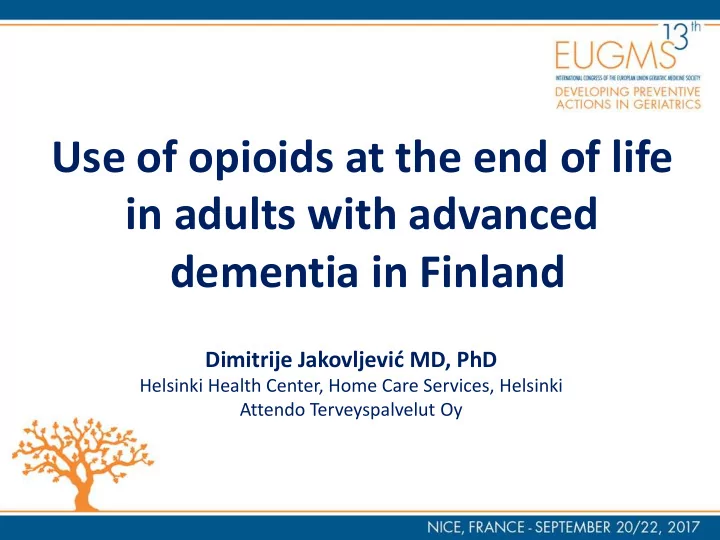

Use of opioids at the end of life in adults with advanced dementia in Finland Dimitrije Jakovljević MD, PhD Helsinki Health Center, Home Care Services, Helsinki Attendo Terveyspalvelut Oy
CONFLICT OF INTEREST DISCLOSURE I have no potential conflict of interest to report
Background • Most dementias are inevitably progressive • Recognizing its terminal stage is the basis in planning the adequate palliative care. • Pain is believed to be undertreated in the elderly especially among patient with dementia. • Opioids are the medication of choice for pain management. • Patients with dementia are more likely to receive opioids for other indications such as end-of-life treatment.
Study objective: • to analyze 3-year trends of analgetic use among residents with end-stage -dementia, in long-term care facilities, in Finland • to investigate if use of opioids among this population differs between Helsinki and other big municipalities in year 2016
• There are three types of long-term care facilities in Finland: • health center wards • residential homes • Intensified nursing homes • Collected data from long-term care facilities was extracted from the Resident Assessment Instrument (RAI)-database held by the National Institute for Health and Welfare, in Finland.
• The RAI-system is a tool for both planning of individual care (goal setting), and measuring quality and efficiency of care units. • The RAI-system establishes a web-based benchmarking database for facilities to compare quality and cost of care (to learn from best practice). • The quality of care is assessed by 27 clinical quality indicators. Statistical analysis • Chi-squares and logistic multivariation tests.
Results • The total number of the assessments in this sample was 23,454 • 3,776 originated from Helsinki • 10,703 from cities with University and/or regional hospitals, • 8,975 from rest of Finland. • Most residents were female 76%. • Mean age of the residents in the study was 84 year.
Distribution of analgetics
All opioids
Morphine
Buprenorphine
Conclusions • This is the first study to investigate use of opioids residents with terminal stage of dementia, in long-term care facilities. • Patients in Helsinki with dementia despite observed more pain were more likely to receive lower doses opioids compared to those in other parts of Finland. • However, the lowest percentage of use was found among intensified nursing home residents. • There are clear differences in treatment of patients with dementia at the end of life between Helsinki and other parts of Finland. • The RAI might be an useful tool in advance care planning
Acknowledge Harriet Finne-Soveri M.D. Ph.D Adjunct professor in Geriatric Medicine, University of Helsinki, Medical Faculty Matti Mäkelä, MD, PhD senior consultant, Institute for Health and Welfare of Finland (THL)
Recommend
More recommend